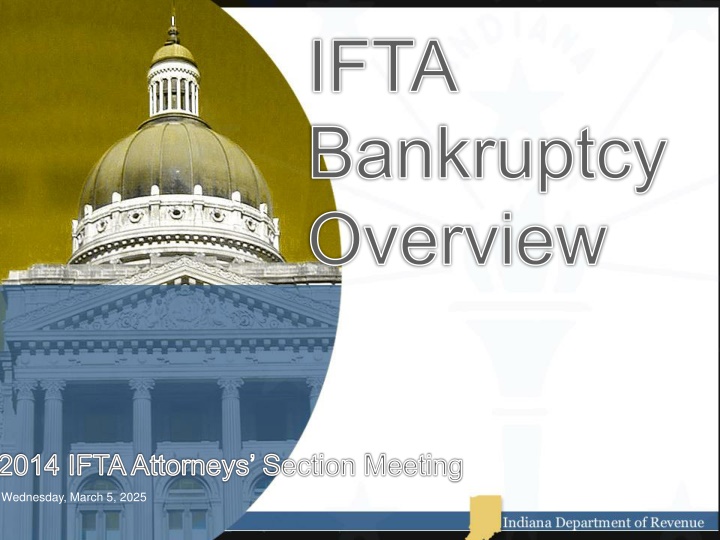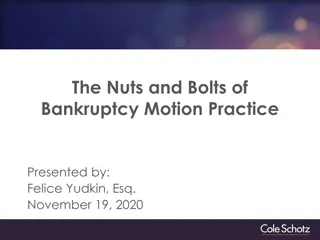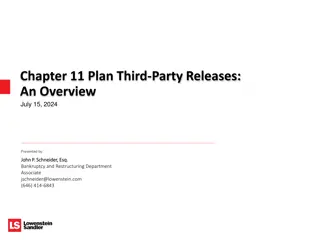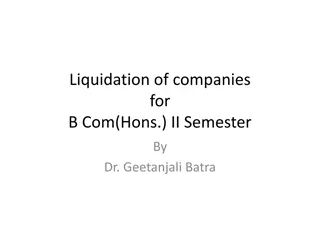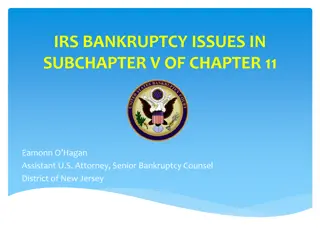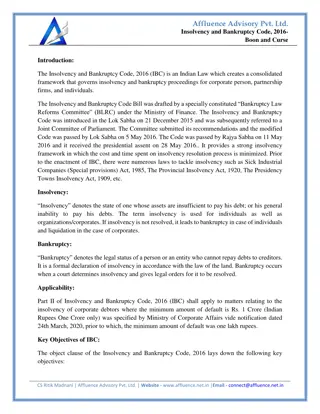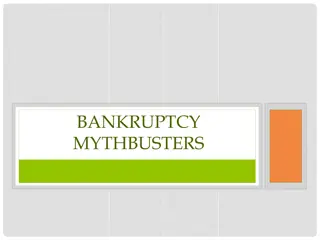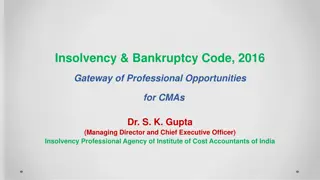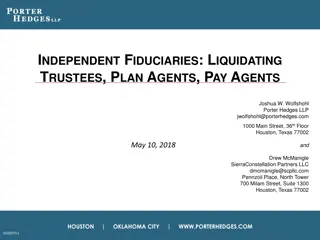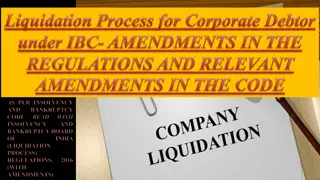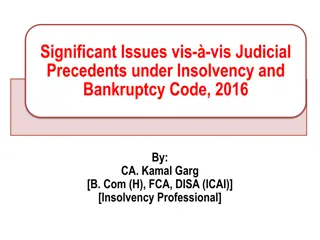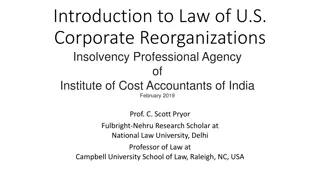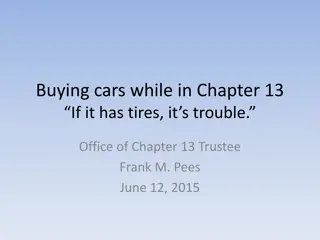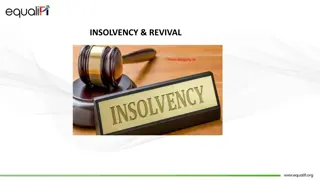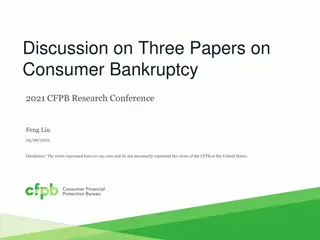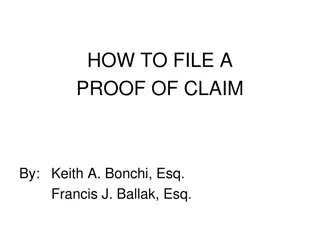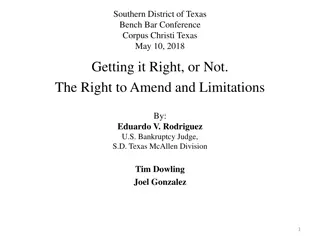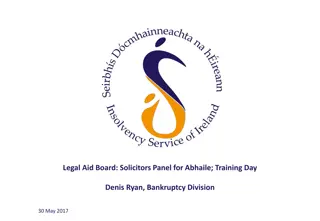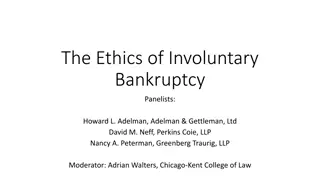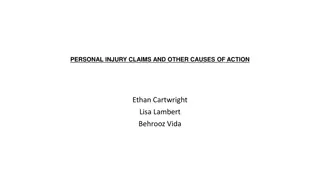Bankruptcy Overview: Key Points and Principles
Explore essential information on bankruptcy including key phrases to remember, general principles, and primary bankruptcy chapters under U.S. law. Understand the significance of Chapters 7 and 11, liability aspects, and discharge implications as per the Federal Bankruptcy Code.
Download Presentation

Please find below an Image/Link to download the presentation.
The content on the website is provided AS IS for your information and personal use only. It may not be sold, licensed, or shared on other websites without obtaining consent from the author.If you encounter any issues during the download, it is possible that the publisher has removed the file from their server.
You are allowed to download the files provided on this website for personal or commercial use, subject to the condition that they are used lawfully. All files are the property of their respective owners.
The content on the website is provided AS IS for your information and personal use only. It may not be sold, licensed, or shared on other websites without obtaining consent from the author.
E N D
Presentation Transcript
IFTA Bankruptcy Overview 2014 IFTA Attorneys Section Meeting Wednesday, March 5, 2025
Background of Bankruptcy Under U.S. Law Wednesday, March 5, 2025
Key Phrases to Remember T/P Claim Code Taxpayer Document stating amount due to agency Federal Bankruptcy Code, the formal breadth of laws which outline, regulate and administer bankruptcy filings in the United States of America Function within Code that stops collection efforts The date the bankruptcy is filed with the U.S. Bankruptcy Court Oversees the collection and disbursement of payments Liability that exists for periods before the filing Automatic Stay Filing date Trustee Pre-Petition Liability Post-Petition Liability Liability that is created after the bankruptcy filing Case Discharged Allows release for the debtor from most debts Wednesday, March 5, 2025
General Principles of Bankruptcy United States Constitution, Art. I, Sec. 8, Cl. 4: authorizes Congress to enact uniform Laws on the subject of Bankruptcies throughout the United States. Bankruptcy is largely governed by federal law. Title 11 of the U.S.C., 101 - 1330, known as the Federal Bankruptcy Code. Major revisions to the Code were made upon the passage of the Bankruptcy Abuse Prevention and Consumer Protection Act (the BAPCPA ). Depending on a debtor s status as an individual or corporation, there are various categories of bankruptcy that a debtor can file. Each category of bankruptcy has it s own chapter under Title 11 that controls the rights of creditors and debtors. For the purposes of an attorney trying to collect taxes from a taxpayer who has filed bankruptcy, most bankruptcies are filed under Chapters 7, 11, and 13 (Chapter 12 might apply). Wednesday, March 5, 2025
Primary Bankruptcy Chapters Chapter 7 Also referred to as pure bankruptcy or straight liquidation. If a debtor has assets, those assets are taken over by a Chapter 7 trustee. The assets are then liquidated, and the Trustee takes the proceeds and disperses them to the creditors based on their priority. If a debtor does not have non-exempt assets, it is called a no asset, so there will not be a liquidation, and there will not be disbursements to creditors. Prior to the BACPA, a debtor had a rebuttable presumption that they were eligible for Chapter 7 protection. Following BACPA, there is now a means test, and if the debtor does not pass this test, they would have to file for a Ch. 13 bankruptcy instead. Wednesday, March 5, 2025
Primary Bankruptcy Chapters Chapter 11 This chapter allows a debtor with considerable liabilities to reorganize. This chapter applies mostly to corporations, but individuals may qualify as well. The debtor normally acts as the trustee and can continue to operate their business while the bankruptcy proceeds as a debtor in possession. Unlike other bankruptcies, discharge occurs when a plan of reorganization is confirmed. The debtor submits this plan to all parties, and when the court confirms, the plan is then binding. Most plans involve reorganization, but there is a Liquidating 11, where assets are transferred to new corporation. Wednesday, March 5, 2025
Primary Bankruptcy Chapters Chapter 13 This chapter allows individuals who are wage earners with regular income to reorganize their financial affairs. The application of this chapter is limited: the individuals liquidated unsecured debtors must be less than $1,149,525.00 and their liquidated secured debts must be less than $383,175.00. The debtor submits a plan which provides for payments over a 3 to 5 year period to the creditors, which the court must approve. Creditors in a Ch. 13 do not get to vote on the plan, but creditors can (and sometimes must) object to the plan. Chapter 13 allows for a much broader discharge than what is allowed in other chapters. Discharge occurs when completed. Wednesday, March 5, 2025
Where Do IFTA Taxes Fall within Bankruptcy? Wednesday, March 5, 2025
Discharging Liabilities In bankruptcy, debtors are released from liability for specific debts with a discharge. Once a debt has been discharged, the creditor cannot seek repayment of that debt from the debtor, because they are no longer personally liable. However, certain debts of an individual debtor are excepted, and are therefore non-dischargeable some as a matter of law, but others upon the court s finding of non-dischargeability after a creditor has filed a timely complaint. This includes many types of state taxes. Additionally, in any bankruptcy besides a Ch. 7, a corporation is entitled to receive a discharge. Wednesday, March 5, 2025
Excepted Taxes 11 USC 523(a)(1) Section 523 specifically provides for 19 types of debts of an individual debtor that cannot be discharged, most of which are self-executing as a matter of law. Whether a specific debt can be discharged is dependent upon: The debtor s status as an individual or a corporation; The bankruptcy chapter case that was filed (7, 11 or 13); and The type of debt. Section 523(a)(1) provides that a tax debt is excepted from discharge where the tax return or equivalent report or notice was not filed or given. Wednesday, March 5, 2025
Excepted Taxes 11 USC 523(a)(1) (a) A discharge under section 727, 1141, 1228(a), 1228(b), or 1328(b) of this title does not discharge an individual debtor from any debt (1) for a tax or a customs duty (A) of the kind and for the periods specified in section 507(a)(3) or 507(a)(8) of this title, whether or not a claim for such tax was filed or allowed; (B) with respect to which a return, or equivalent report or notice, if required (i) was not filed or given; or (ii) was filed or given after the date on which such return, report, or notice was last due, under applicable law or under any extension, and after two years before the date of the filing of the petition; or (C) with respect to which the debtor made a fraudulent return or willfully attempted in any manner to evade or defeat such tax; Wednesday, March 5, 2025
Priority Claim 11 USC 507(a)(8) Section 507(a) proscribes a list of ten categories of unsecured claims, and sets them in order of the priority of distribution. Subdivision (8) in that list of claims are taxes, prioritized in the following order: (A) Income Taxes (B) Ad valorem/Property Taxes (C) Trust Fund Taxes (D) Employment Taxes (E) Excise Taxes (F) Custom Duty (G) Penalties related to a claim for taxes Wednesday, March 5, 2025
Priority Claim 11 USC 507(a)(8)(E) So where does IFTA fall? Trust Tax under (C): a tax required to be collected or withheld and for which the debtor is liable in whatever capacity - NO Excise Tax under (E): an excise tax on (i) a transaction occurring before the date of the filing of the petition for which a return, if required, is last due, under applicable law or under any extension, after three years before the date of the filing of the petition; or (ii) if a return is not required, a transaction occurring during the three years immediately preceding the date of the filing of the petition - YES Wednesday, March 5, 2025
Priority Claim 11 USC 507(a)(8)(E) Black s defines excise as: a tax imposed on the manufacture, sale, or use of goods (such as a cigarette tax), or on an occupation or activity (such as a license tax or an attorney occupation fee). Black s Law Dictionary, (9th. Ed.,2009). Each jurisdiction has their respective fuel use tax, and fuel use taxes are excise taxes on the sale of fuel. The IFTA provides for apportioning those taxes to the jurisdictions in which the fuel is used. Wednesday, March 5, 2025
Filing a Claim for IFTA Wednesday, March 5, 2025
A Few Things to Keep in Mind The Automatic Stay 11 USC 362 It is effective upon filing, collection efforts must cease. It s like blowing a whistle during a game: play stops (although you can perform an audit, you can send a demand notice - you just can t advance warrants). Is the claim Secured or Unsecured? In other words, does your agency have a lien? Could be unsecured because you don t have a lien. If it s unsecured, does the claim have Priority? If you don t have priority, then it becomes general unsecured. Wednesday, March 5, 2025
Filing Claim for IFTA Liabilities 507(a)(8)(E): (i) a transaction occurring before the date of the filing of the petition for which a return, if required, is last due, under applicable law or under any extension, after three years before the date of the filing of the petition; or (ii) if a return is not required, a transaction occurring during the three years immediately preceding the date of the filing of the petition In other words: Fuel taxes would be exempt if a return was never filed, or if they file a return and file for bankruptcy within 2 years. Filed a timely return, an exemption for any excise tax if it was due within three years of filing. Wednesday, March 5, 2025
Filing Claim for IFTA Liabilities But IFTA is also a claim that s filed on behalf of the jurisdiction and every other jurisdiction that is owed taxes under the IFTA liability. 501(e) A claim arising from the liability of a debtor for fuel use tax assessed consistent with the requirements of section 31705 of title 49 may be filed by the base jurisdiction designated pursuant to the International Fuel Tax Agreement (as defined in section 31701 of title 49) and, if so filed, shall be allowed as a single claim. Wednesday, March 5, 2025
IN Department of Revenues Procedure T/P (the Debtor - company or individual) files for bankruptcy. DOR Bankruptcy Section receives notice from debtor s counsel. DOR sets a Bankruptcy Hold in our system within 1 day of receipt of notice to be in compliance with the bankruptcy Automatic Stay. DOR analyst files a Proof of Claim with the Bankruptcy Court through PACER. Debtor s counsel files plan for payment, to be paid off over a period of up to 5 years. The plan is agreed on by the debtors and all creditors and is approved by the Bankruptcy Court. Wednesday, March 5, 2025
Issues Debtor Didn t List Agency as Creditor It happens! Liabilities will continue to stage. When DOR finally does receive notice, the Bankruptcy Section has to undo levy and collection of payments. Although this is not DOR s fault, it is time consuming work. If it s not listed, and it s past the bar date, the bankruptcy attorney should file a Motion to Allow Late Claim. Wednesday, March 5, 2025
Issues Debtor Hasn t Filed All Returns When a T/P has not filed a return, the Department creates a best information available ( BIA ) liability. When a debtor has not filed returns, these liabilities are nondischargeable. After the proof of claim is filed, T/P may seek to reduce the BIA liabilities by filing the required returns. Additional hearings have to be held, and the claim will need to be amended. Wednesday, March 5, 2025
Issues The IRS Also Has a Claim In a situation where a debtor does not have much money to go around to all of its creditors, there might be a debate where both the IRS and the state revenue agency might have potential claims . It is not the case that the IRS will always have priority over the state agency. It depends on who perfects the lien first. If the state agency perfects their lien before the IRS does, then the state agency would have priority over the IRS. It s basically a race to the courthouse. Wednesday, March 5, 2025
Issues DOR Doesn t Put Hold on Collections If DOR doesn t set Bankruptcy Hold timely, liabilities stage or post-petition liabilities don t get added to our Case Management software. This is a violation of the Automatic Stay, and DOR can be fined and sanctioned by the Bankruptcy Court and made to pay damages. It is extremely important to put holds on the liabilities! You may be able to cancel licenses for issues of public safety; however, if the debtor cannot operate its vehicles, the debtor can t make money to pay off creditors. Wednesday, March 5, 2025
Issues Responsible Officers The issue is whether taxpayer is responsible, not whether tax is due. State law normally controls: IC 6-3-4-8(g) on income/withholding: In the case of a corporate or partnership employer, every officer, employee, or member of such employer, who, as such officer, employee, or member is under a duty to deduct and remit such taxes shall be personally liable for such taxes, penalties, and interest. Indiana Dept. of State Revenue vs. Safayan, 654 N.E.2d 270 (Ind., 1995): The statutory duty to remit trust taxes falls on any officer or employee who has the authority to see that they are paid. Wednesday, March 5, 2025
Issues Look Back Periods The trustee can examine transfers made within two years before bankruptcy was filed. State law may extend this period beyond two years for fraud. If the debtor files late, and within two years, it s general unsecured, nondischargeable. A trustee might look back for payments that should not have been made during this period, but for IFTA taxes, it s the cost of doing business if those taxes had not been paid, IFTA licensure could have been revoked, and the trucks couldn t have run. Wednesday, March 5, 2025
Issues Tolling These involved serial filers, or debtors who keep filing for bankruptcy, in an attempt to escape liabilities. When a bankruptcy is filed, the automatic stay kicks in, so people try to re-file in order to keep the stay going as long as possible so that the statutes of limitation for liabilities runs out. Tolling allows the statute of limitations to be extended for creditors to collect liabilities, preserving creditors rights. 11 USC 108(c). Example: T/P owes taxes in 2000, 2001, and 2002 Bankruptcy filed in 2003, but case gets dismissed in 2004 Bankruptcy filed again in 2005, is dismissed again Not precluded from collection; statute of limitations extended Wednesday, March 5, 2025
Example Let s say there are 10 years of IFTA liabilities, 2004-2013 2004 through 2007, agency has a lien on property 2008 through 2013, no lien Bankruptcy is filed on January 1, 2014 2004 through 2007 are secured 2013, 2012, 2011, and 4Q 2010 would have priority unsecured Remaining periods would be general unsecured 2004 2005 2006 2007 2008 2009 2010 2011 2012 2013 1Q 1Q 1Q 1Q 1Q 1Q 1Q 1Q 1Q 1Q 2Q 2Q 2Q 2Q 2Q 2Q 2Q 2Q 2Q 2Q 3Q 3Q 3Q 3Q 3Q 3Q 3Q 3Q 3Q 3Q 4Q 4Q 4Q 4Q 4Q 4Q 4Q 4Q 4Q Wednesday, March 5, 2025
Relevant Case Law Wednesday, March 5, 2025
Relevant Cases In re Fagan In re Fagan, 465 B.R. 472 (Bkrtcy.E.D.Mich., 2012) Facts: Taxpayers filed Ch. 7 bankruptcy, where they listed state taxes, including IFTA, as a listed debt by business in which wife was corporate officer. Received a discharge in 2010. Taxpayers reopened case in 2011, because Michigan Department of Treasury continued to collect on the IFTA liabilities. Issue: whether fuel taxes owed to state pursuant to International Fuel Tax Agreement were excise taxes on transactions and nondischargeable. Wednesday, March 5, 2025
Relevant Cases In re Fagan Court determined: [T]he international fuel tax is an excise tax on a transaction, and therefore is a priority claim under 507(a)(8)(E), which is a type of nondischargeable tax specified in 523(a)(1)(A). Fagan at 479. Court used a six-point test established in Ohio Bureau of Workers' Compensation v. Yoder (In re Suburban Motor Freight, Inc.), 36 F.3d 484 (6th Cir.1994) (also referred to as "Suburban II") for determining whether the international fuel tax was a tax. Further determined that the international fuel tax was an excise tax, and that it was an excise tax on a transaction. Wednesday, March 5, 2025
Relevant Cases Matter of Best Refrigerated Exp., Inc. Matter of Best Refrigerated Exp., Inc., 192 B.R. 503 (Bkrtcy.D.Neb.,1996) Facts: Taxpayer was a trucking company who filed a Ch. 11 reorganizing petition. Trustee was appointed to liquidate the debtor. Nebraska and Iowa filed claims for administrative expenses relating to fuel taxes. Nebraska adjusted claim because it was a BIA; TP had never filed return. Relevant Issue: should Nebraska s amended claim be disallowed because the amendment was filed five years after the original claim was filed and after the claims bar date for filing administrative claims expired? Wednesday, March 5, 2025
Relevant Cases Matter of Best Refrigerated Exp., Inc. Court determined: When a creditor moves to amend a proof of claim and that amendment seeks to correct a miscalculation in the original proof of claim, such an amendment should be allowed pursuant to Federal Rule 15(a), especially when there is no real prejudice to the estate or bad faith by creditor. Best Refrigerated at 508. Applied Rule 15 of the Fed. Rules of Civil Procedure per 7015. Nebraska amended its claim because of an error in the original computation of the amount of the fuel tax, as IFTA just went effect in 1990 right after the Trustee was assigned, and the Trustee did not file the correct returns. The amendment sought to rectify the computation error and not to enlarge the tax as a result of changing the substance of the claim. Wednesday, March 5, 2025
Relevant Cases In re Burlington Motor Holdings, Inc. In re Burlington Motor Holdings, Inc., 235 B.R. 741 (Bkrtcy.D.Del., 1999) Facts: Debtors and Indiana (on behalf of other jurisdictions) entered into an agreement to pay IRP fees after case had commenced. Debtors entered into a payment plan, and in 11th month, reduced number of vehicles in fleet, sought to get refund for plate fees that weren t used. Indiana did not allow it, instead required them to pay full amount and then seek reimbursement through a refund. Wednesday, March 5, 2025
Relevant Cases In re Burlington Motor Holdings, Inc. Facts (cont.): Plaintiff was a successor corporation that had purchased the assets of a trucking company that had gone through Ch. 11 restructuring. Plaintiff sought refund of IRP payments that debtor made post-petition. Several states involved, and 25 states were dismissed from the case due to sovereign immunity. Issue: whether the post-petition overpayments by debtors of IRP fees were not an administrative expense of debtors' estates. Wednesday, March 5, 2025
Relevant Cases In re Burlington Motor Holdings, Inc. Court determined: Because Debtors were required to register and pay the fees under the IRP in order to conduct their interstate trucking business, we conclude that the payment of the IRP fee was an ordinary course of business expense for Debtors that was an actual and necessary cost of business and, therefore, an administrative expense. Burlington at 746. Although the court determined that section 503(b)(1)(B), an administrative expense claim for a tax would not apply, section 503(b)(1)(A) as the actual, necessary costs and expenses of preserving the estate would apply. Debtor and Indiana did not seek court approval for the agreement, and no challenge was brought regarding the propriety of payment of fees indicate[d] that payment of the fee was considered an ordinary course of business expense by all parties in interest. 746. Wednesday, March 5, 2025
Contact Information: Collin Davis Indiana Department of Revenue 100 N. Senate Ave. IGCN 248 Indianapolis, IN 46204 PH: (317) 233-5209 Fax: (317) 233-6489 Wednesday, March 5, 2025
